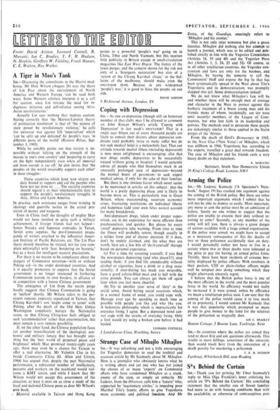A Tiger in Mao's Tank
ion
IL
r]2 710
From: David Ashton, Leonard Cottrell, R. Marcetic, Ian C. Bradley, T. F. H. Hudson, N. Hopkin, Geoffrey W. Fielding, Frank Hauser, C. E. Walton, Ray Waller.
SIR,—Discussing the convulsions in the Maoist mad- house, Mr Dick Wilson (August 26) says the thesis of Lin Piao about the encirclement of North America and Western Europe 'can be read both ways. Some Western scholars interpret it as a call for caution, since Lin stresses the need for in- digenous initiative and self-reliance among Afro- Asian revolutionaries.'
Actually Lin says nothing that inspires caution. Stating correctly that 'the Marxist-Leninist theory of proletarian revolution' is that of 'the seizure of state power by revolutionary violence,' he calls for universal war against US 'imperialism' which 'can be split up and defeated' by people's wars 'in different parts of the world' (Renmin Ribao. Sep- tember 3, 1965).
While he sensibly points out that victory is im- possible without 'relying on the strength of the masses in one's own country' and 'preparing to carry on the fight independently even when all material aid from outside is cut off.' he also insists that 'the peoples of the world invariably support each other' in these struggles:
Those countries which have won victory are duty bound to support and aid the peoples who have not yet done so.... The socialist countries should regard it as their internationalist duty to support the people's revolutionary struggles in Asia, Africa and Latin America.
• In practice, such assistance ranges from training in ideology and guerrilla tactics to the actual pro- vision of money and weapons.
Even in China itself the thoughts of mighty Mao would not have resulted in quite such a military achievement, if foreign friends had not helped- Sanzo Nosaka and Japanese comrades in Yenan, Soviet arms supplies, the pro-Communist propa- ganda of writers attached to the influential Ameri- can Institute of Pacific. Relations, etc. The Lin Piao thesis should therefore be treated, not (as you com- plain editorially) with 'fear, bordering on hysteria,' but as a basis for intelligent western precautions.
For there is no reason to be complacent about the dangers of Communist terrorism—with or without Peking aid—in the under developed countries. And it is equally premature to suppose that the Soviet government is no longer interested in furthering Communism outside its own borders, in alliance or in competition with a future Chinese government.
The emergence of Lin from the recent purge hardly suggests that Chinese Communism is going to 'mellow' shortly. Mr Wilson refers to the per- sistent rumour, expressly repudiated in Taiwan, that Chiang Kai-shek's son 'might come to terms' with Peking, after the death of the Old Men. Unless Washington completely betrays the Nationalist cause, so that Chiang Ching-kuo feels obliged to seek 'accommodation' rather than extermination, this must remain a very remote possibility.
If, on the other hand, the Chinese population faces yet another intensification of the ideological, eco- nomic and military lunacy that has brought any- thing but the `new world of perpetual peace and brightness' which Mao promised twenty-eight years ago, there may even be a chance for Taiwan to offer a real alternative. Mr Valentin Chu in his Inside Communist China (G. Allen and Unwin, 1964) has argued that, despite the past Nationalist performance, a substantial number of intellectuals, peasants and workers on the mainland would wel- come a KMT return, and while I know that Mr Wilson would not accept this asssessment of the situation, at least it rests on as close a study of the local and national Chinese press as does Mr Wilson's own book.
. Material available in Taiwan and Hong Kong
points to a powerful 'people's war' going on in China, Tibet and North Vietnam; but this receives little publicity in Britain except in small-circulation magazines like East West Digest. The frenzy of the latest purges, and the concern shown for the risk not only of a 'bourgeois restoration' but also of a 'return of the Chiang Kai-shek clique.' in the bul- letins of the madhouse, should make even the SPECTATOR think. Because in any widespread 'people's war,' it is good to have the people on our side. DAVID ASHTON
9 Richmond Avenue, London. E4






























 Previous page
Previous page